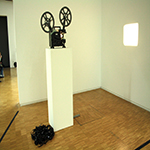Euroacademia Conferences
 Europe Inside-Out: Europe and Europeanness Exposed to Plural Observers (9th Edition) April 24 - 25, 2020
Europe Inside-Out: Europe and Europeanness Exposed to Plural Observers (9th Edition) April 24 - 25, 2020 Identities and Identifications: Politicized Uses of Collective Identities (9th Edition) June 12 - 13, 2020
Identities and Identifications: Politicized Uses of Collective Identities (9th Edition) June 12 - 13, 2020 8th Forum of Critical Studies: Asking Big Questions Again January 24 - 25, 2020
8th Forum of Critical Studies: Asking Big Questions Again January 24 - 25, 2020 Re-Inventing Eastern Europe (7th Edition) December 13 - 14, 2019
Re-Inventing Eastern Europe (7th Edition) December 13 - 14, 2019 The European Union and the Politicization of Europe (8th Edition) October 25 - 26, 2019
The European Union and the Politicization of Europe (8th Edition) October 25 - 26, 2019 Identities and Identifications: Politicized Uses of Collective Identities (8th Edition) June 28 - 29, 2019
Identities and Identifications: Politicized Uses of Collective Identities (8th Edition) June 28 - 29, 2019 The European Union and the Politicization of Europe (7th Edition) January 25 - 26, 2019
The European Union and the Politicization of Europe (7th Edition) January 25 - 26, 2019 7th Forum of Critical Studies: Asking Big Questions Again November 23 - 24, 2018
7th Forum of Critical Studies: Asking Big Questions Again November 23 - 24, 2018 Europe Inside-Out: Europe and Europeanness Exposed to Plural Observers (8th Edition) September 28 - 30, 2018
Europe Inside-Out: Europe and Europeanness Exposed to Plural Observers (8th Edition) September 28 - 30, 2018 Identities and Identifications: Politicized Uses of Collective Identities (7th Edition) June 14 - 15, 2018
Identities and Identifications: Politicized Uses of Collective Identities (7th Edition) June 14 - 15, 2018
Nostalgia for a Great Past
-
-

-
Presentation speakers
- Peter Seifert, Independent Researcher, Augsburg, Germany
- Download presentation
Abstract:
Andrei Tarkovsky (1932 – 1986), the great Russian film director, has a renown that has grown slowly but surly over the past decades. Refusing to be labelled a dissident, from his start he made utmost subjective veracity his inner compass, running up against a system, in which mendacity seemed to be endemic. Due to his international reputation he was in some ways privileged among Soviet filmmakers, nonetheless he could realize only seven films because of constant hampering by the authorities. Nostalghia (1983) is about a Russian intellectual visiting Italy with a research interest regarding an 18th Century Russian composer. But the film is very little plot-driven and mainly about the feelings and melancholic reveries of a Russian far from his home. More importantly, it is about the possibility of spiritual communion between Eastern and Western Europe, namely Italy and Russia. In a way Italy could be considered the heartland of Western Europe, and Russia the cold heartland of Eastern Europe. Tarkovsky’s protagonist states in the beginning of the film bluntly that he is deeply sceptical about the possibility of this communion. Tarkovsky in person repeated this assessment not less bluntly in interviews and discussions. Notwithstanding this apparent scepticism, he endeavoured to create a true artistic unity between an important Italian work of art and an important Russian work of poetry: the “Madonna del Parto” (c.1465) by Piero della Francesca and the poem “Ptichka – Little Bird” by Aleksander Pushkin. In another rather spectacular scene of the film, from the back of the equestrian monument of Marc Aurel, the doomed idealist Domenico gives a speech on universal brotherhood. Tarkovsky gives on that occasion Beethoven’s “Ode to Joy” an apparently rough ride conveying a deep meaning. Diplomacy not being a major concern for Tarkovsky, he made daring statements worth to be diplomatic about.
-
Related Presentations

Security and Integration Issues in the Relations between the European Union and the Western Balkans
- Marília Bortoluzzi Severo

Production Networks in Europe: A Natural Experiment of the EU Enlargement to the East
- Inmaculada Martínez-Zarzoso
- Anca M. Voicu
- Martina Vidovic

A Typology of Political Identity in the Deepening Eurozone
- Paul Gillespie














